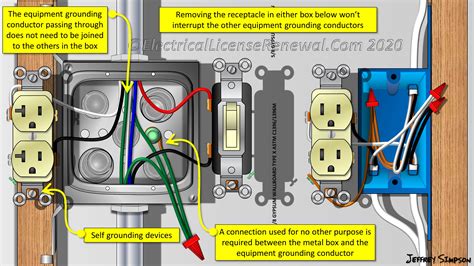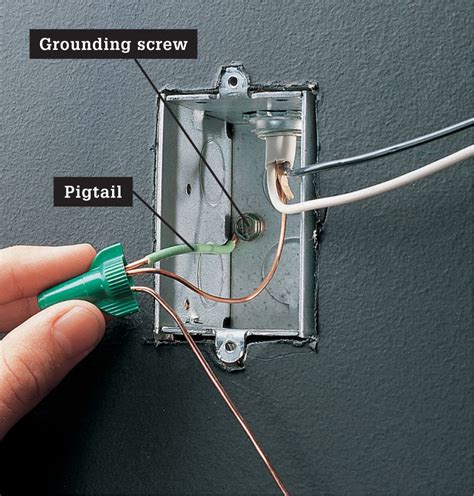are metal electrical boxes grounded If a metal box is being used, best practice is to insert a green grounding screw into the threaded hole in the back of the box or enclosure. The equipment-grounding wires then connect to the screw, making the metal box . $16.95
0 · metal electrical box grounding
1 · grounded metal box
2 · do metal outlet boxes ground
3 · do metal junction boxes use grounding wire
4 · do metal boxes ground switches
5 · do electrical boxes need grounding
6 · do electrical boxes ground
7 · are metal boxes grounded
$29.99
metal electrical box grounding
china aluminum cnc milling parts supplier
grounded metal box
Use a metal electrical box when metal-sheathed cable (also called armored BX cable) or metal conduit runs in or out of the box. Metal cable and conduit depend on the . A grounded metal box is important to have as it sends the electricity through the ground to the breaker box that is also grounded. Surges in the electricity a box that is not grounded allows the electricity to go where it .What Happens if You Don’t Ground a Metal Electrical Box? In a word, an ungrounded metal electrical box in your house is an extremely serious safety and health hazard. In the worst .
If a metal box is being used, best practice is to insert a green grounding screw into the threaded hole in the back of the box or enclosure. The equipment-grounding wires then connect to the screw, making the metal box . Summary: Determining if a metal electrical box is grounded is essential for ensuring electrical safety in your home or workplace. A properly grounded box ensures that any excess electrical current can be safely .Only metal boxes need to be grounded. However, the grounding wires in a plastic outlet or switch box should not be cut back so short that they are challenging to work with. You must allow enough slack so that all wires in an electrical box .

Do All Metal Junction Boxes Need to Be Grounded? Only metal boxes that carry live electricity need to be grounded since they will pose a danger of shock and electrocution if they become energized. For example, a metal . To visually inspect an electrical box for grounding, you can check for the presence of a green or bare copper wire connected to the box or a grounding screw. You can also look for a grounding bus bar within the box, .
china aluminum 6061 cnc machining factory
Several Journeymen have stated that if you run metal conduit, the conduit is considered grounded, thus a ground screw in every j-box is not required (the same answer . You don't need a wire to ground the switch, the mounting screws satisfy the requirement when used with metal boxes, and there is an exception that allows you to not satisfy grounding requirements if no grounding means exists for replacement switches. Use a metal electrical box when metal-sheathed cable (also called armored BX cable) or metal conduit runs in or out of the box. Metal cable and conduit depend on the contact from its metal sheathing to the metal box to complete grounding. A grounded metal box is important to have as it sends the electricity through the ground to the breaker box that is also grounded. Surges in the electricity a box that is not grounded allows the electricity to go where it wants to.

So while you may not have to connect the equipment grounding conductor to the box, the boxes do have to be grounded and bonded. Since you're using EMT, the boxes can be grounded and bonded via the conduit. If you were using nonmetallic conduit, you'd have to ground the boxes some how.What Happens if You Don’t Ground a Metal Electrical Box? In a word, an ungrounded metal electrical box in your house is an extremely serious safety and health hazard. In the worst-case scenario, it can cause a fire or an electric shock in you or one of your family members. If a metal box is being used, best practice is to insert a green grounding screw into the threaded hole in the back of the box or enclosure. The equipment-grounding wires then connect to the screw, making the metal box part of the grounding system.
Summary: Determining if a metal electrical box is grounded is essential for ensuring electrical safety in your home or workplace. A properly grounded box ensures that any excess electrical current can be safely redirected into the ground, minimizing the risk of electrical shock, damage to appliances, or fires.
Only metal boxes need to be grounded. However, the grounding wires in a plastic outlet or switch box should not be cut back so short that they are challenging to work with. You must allow enough slack so that all wires in an electrical box are at least six inches (150mm) long (Article 300.14).
Do All Metal Junction Boxes Need to Be Grounded? Only metal boxes that carry live electricity need to be grounded since they will pose a danger of shock and electrocution if they become energized. For example, a metal electrical box that contains only a switch would not require grounding.
To visually inspect an electrical box for grounding, you can check for the presence of a green or bare copper wire connected to the box or a grounding screw. You can also look for a grounding bus bar within the box, which is typically made of metal and provides a connection point for grounding wires.
You don't need a wire to ground the switch, the mounting screws satisfy the requirement when used with metal boxes, and there is an exception that allows you to not satisfy grounding requirements if no grounding means exists for replacement switches. Use a metal electrical box when metal-sheathed cable (also called armored BX cable) or metal conduit runs in or out of the box. Metal cable and conduit depend on the contact from its metal sheathing to the metal box to complete grounding. A grounded metal box is important to have as it sends the electricity through the ground to the breaker box that is also grounded. Surges in the electricity a box that is not grounded allows the electricity to go where it wants to. So while you may not have to connect the equipment grounding conductor to the box, the boxes do have to be grounded and bonded. Since you're using EMT, the boxes can be grounded and bonded via the conduit. If you were using nonmetallic conduit, you'd have to ground the boxes some how.
What Happens if You Don’t Ground a Metal Electrical Box? In a word, an ungrounded metal electrical box in your house is an extremely serious safety and health hazard. In the worst-case scenario, it can cause a fire or an electric shock in you or one of your family members.
If a metal box is being used, best practice is to insert a green grounding screw into the threaded hole in the back of the box or enclosure. The equipment-grounding wires then connect to the screw, making the metal box part of the grounding system. Summary: Determining if a metal electrical box is grounded is essential for ensuring electrical safety in your home or workplace. A properly grounded box ensures that any excess electrical current can be safely redirected into the ground, minimizing the risk of electrical shock, damage to appliances, or fires.Only metal boxes need to be grounded. However, the grounding wires in a plastic outlet or switch box should not be cut back so short that they are challenging to work with. You must allow enough slack so that all wires in an electrical box are at least six inches (150mm) long (Article 300.14).
Do All Metal Junction Boxes Need to Be Grounded? Only metal boxes that carry live electricity need to be grounded since they will pose a danger of shock and electrocution if they become energized. For example, a metal electrical box that contains only a switch would not require grounding.

$288.00
are metal electrical boxes grounded|do metal outlet boxes ground